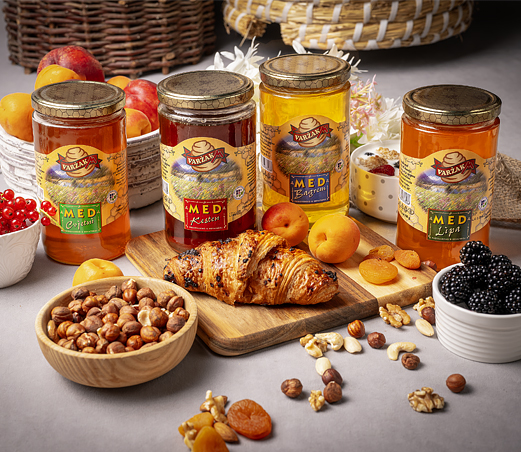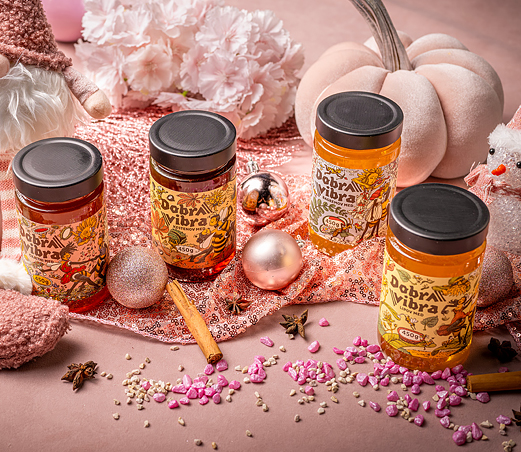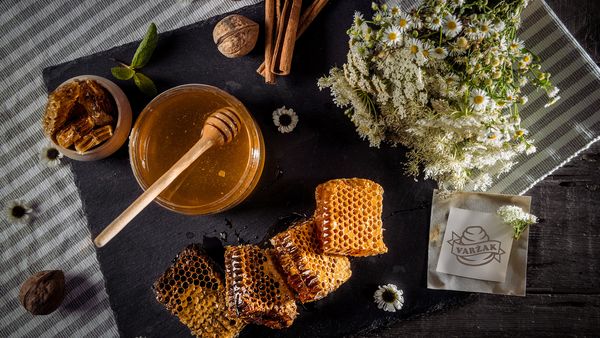Natural Antibiotic in a Jar – How Honey Boosts Immunity
Honey and Immunity – Natural Power in a Jar
Honey is not just a sweet delight but also a true natural ally for health. It has been used as a remedy since ancient times, and modern research confirms its antibacterial, antiviral, and anti-inflammatory properties. Thanks to its unique composition, honey is often described as a “natural antibiotic in a jar,” and its role in strengthening the immune system is increasingly recognized.
Antibacterial and Antiviral Properties of Honey
One of the reasons honey is so effective in fighting bacteria and viruses lies in its composition. It contains the enzyme glucose oxidase, which produces hydrogen peroxide – a natural substance known for its strong antibacterial action. In addition, its high concentration of natural sugars and low pH create an environment in which bacteria cannot easily multiply.
Scientific studies have shown that local varieties such as floral, acacia, linden, and chestnut honey also possess strong antibacterial properties, used in both traditional and modern medicine.
Antioxidants as Immune Protectors
Honey is rich in flavonoids and polyphenols, natural antioxidants that neutralize free radicals and protect cells from damage. These compounds play a key role in supporting the immune system by reducing oxidative stress and promoting overall balance in the body.
Regular consumption of honey may help reduce chronic inflammation, which is crucial in preventing diseases associated with weakened immunity. This is why it is often recommended to include honey in your diet, especially during autumn and winter when the body is more vulnerable to infections.
Honey and Seasonal Illnesses
Most of us have reached for a spoonful of honey when suffering from a sore throat or cough. Its strength lies in the ability to soothe the mucous membranes, reduce irritation, and ease cold symptoms. Honey coats the throat with a thin layer, relieving the scratching sensation and promoting expectoration.
Moreover, honey combined with warm drinks or herbal teas has a calming effect and supports faster recovery. Its antiviral action is particularly helpful during seasonal infections, making honey a staple in many households as the first natural remedy.
How to Use Honey to Boost Immunity
- One spoon of honey in the morning on an empty stomach – provides quick energy and stimulates digestion.
- Honey in warm drinks – add it to tea, milk, or warm beverages, but only once they have cooled slightly, as high temperatures can destroy enzymes.
- Combinations with natural ingredients – honey with lemon and ginger is a classic immune booster; honey with cinnamon is used for energy and blood sugar balance.
Which Honey to Choose?
- Acacia honey – mild, light-colored, and delicate, ideal for children (over 1 year) and sensitive stomachs.
- Chestnut honey – darker and more intense, rich in minerals, and highly valued for strengthening immunity.
- Linden honey – known for its soothing effect, often used for colds and insomnia.
- Floral honey – a diverse blend of nectars that provides balance in flavor and nutrients.
Conclusion
Honey is much more than a natural sweetener. Its antibacterial, antiviral, and antioxidant properties make it a unique natural ally for health. Regular and moderate consumption of honey can strengthen the immune system, reduce the risk of infections, and speed up recovery during seasonal illnesses. Include it in your daily routine and discover why honey truly deserves the name – a natural antibiotic in a jar.












